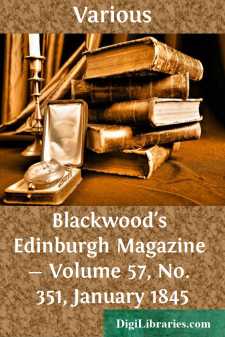Categories
- Antiques & Collectibles 13
- Architecture 36
- Art 48
- Bibles 22
- Biography & Autobiography 813
- Body, Mind & Spirit 142
- Business & Economics 28
- Children's Books 15
- Children's Fiction 12
- Computers 4
- Cooking 94
- Crafts & Hobbies 4
- Drama 346
- Education 46
- Family & Relationships 57
- Fiction 11828
- Games 19
- Gardening 17
- Health & Fitness 34
- History 1377
- House & Home 1
- Humor 147
- Juvenile Fiction 1873
- Juvenile Nonfiction 202
- Language Arts & Disciplines 88
- Law 16
- Literary Collections 686
- Literary Criticism 179
- Mathematics 13
- Medical 41
- Music 40
- Nature 179
- Non-Classifiable 1768
- Performing Arts 7
- Periodicals 1453
- Philosophy 64
- Photography 2
- Poetry 896
- Political Science 203
- Psychology 42
- Reference 154
- Religion 513
- Science 126
- Self-Help 84
- Social Science 81
- Sports & Recreation 34
- Study Aids 3
- Technology & Engineering 59
- Transportation 23
- Travel 463
- True Crime 29
Blackwood's Edinburgh Magazine - Volume 57, No. 351, January 1845
by: Various
Description:
Excerpt
HOMER, DANTE, AND MICHAEL ANGELO.
There is something inexpressibly striking, it may almost be said awful, in the fame of Homer. Three thousand years have elapsed since the bard of Chios began to pour forth his strains; and their reputation, so far from declining, is on the increase. Successive nations are employed in celebrating his works; generation after generation of men are fascinated by his imagination. Discrepancies of race, of character, of institutions, of religion, of age, of the world, are forgotten in the common worship of his genius. In this universal tribute of gratitude, modern Europe vies with remote antiquity, the light Frenchman with the volatile Greek, the impassioned Italian with the enthusiastic German, the sturdy Englishman with the unconquerable Roman, the aspiring Russian with the proud American. Seven cities, in ancient times, competed for the honour of having given him birth, but seventy nations have since been moulded by his productions. He gave a mythology to the ancients; he has given the fine arts to the modern world. Jupiter, Saturn, Mars, Juno, are still household words in every tongue; Vulcan is yet the god of fire, Neptune of the ocean, Venus of love. When Michael Angelo and Canova strove to embody their conceptions of heroism or beauty, they portrayed the heroes of the Iliad. Flaxman's genius was elevated to the highest point in embodying its events. Epic poets, in subsequent times, have done little more than imitate his machinery, copy his characters, adopt his similes, and, in a few instances, improve upon his descriptions. Painting and statuary, for two thousand years, have been employed in striving to portray, by the pencil or the chisel, his yet breathing conceptions. Language and thought itself have been moulded by the influence of his poetry. Images of wrath are still taken from Achilles, of pride from Agamemnon, of astuteness from Ulysses, of patriotism from Hector, of tenderness from Andromache, of age from Nestor. The galleys of Rome were, the line-of-battle ships of France and England still are, called after his heroes. The Agamemnon long bore the flag of Nelson; the Ajax perished by the flames within sight of the tomb of the Telamonian hero, on the shores of the Hellespont; the Achilles was blown up at the battle of Trafalgar. Alexander the Great ran round the tomb of Achilles before undertaking the conquest of Asia. It was the boast of Napoleon that his mother reclined on tapestry representing the heroes of the Iliad, when he was brought into the world. The greatest poets of ancient and modern times have spent their lives in the study of his genius or the imitation of his works. Withdraw from subsequent poetry the images, mythology, and characters of the Iliad, and what would remain? Petrarch spent his best years in restoring his verses. Tasso portrayed the siege of Jerusalem, and the shock of Europe and Asia, almost exactly as Homer had done the contest of the same forces, on the same shores, two thousand five hundred years before. Milton's old age, when blind and poor, was solaced by hearing the verses recited of the poet, to whose conceptions his own mighty spirit had been so much indebted; and Pope deemed himself fortunate in devoting his life to the translation of the Iliad....












